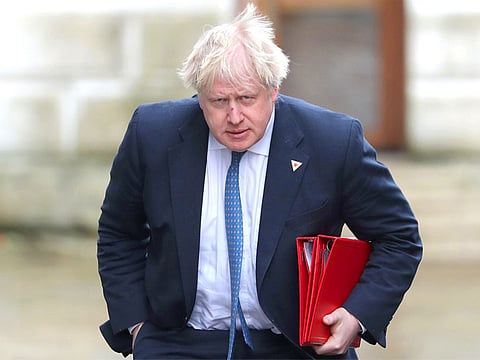Johnson’s burqa views reflect a Tory problem
The former UK foreign secretary is merely using it to project himself as a restrained liberal unafraid to tell Muslims what their place is

Who had bet that it would be three weeks before Boris Johnson was back at it? It was only a matter of (a very brief period of) time. It was really mystifying to see some people celebrate Johnson’s resignation as foreign secretary last month, as if that implied in any way that he was purged. He was merely resting, recalibrating, repositioning.
And so three weeks later, he re-emerged. What did his brief time away from the political fray instil in him? Some humility perhaps? Some sense of genuine distress at the no-deal Brexit that the country seems to be hurtling towards? Some concern for his own party, riven with internal feuds while under the leadership of a prime minister who is standing in the middle of a circular firing squad?
No, Johnson, veteran of the Tory cabinet, architect of Brexit and erstwhile foreign secretary emerged with some very strong opinions on ... the burqa.
You will be forgiven for thinking, given how often this issue comes up in political debate and the right-wing press, that there is an utter epidemic of burqa-wearing in Britain, that there is a veritable crime-wave being committed from behind its cunning disguise. If you don’t care about the poor women, then at least give some thought to the famous security concerns. I have been mugged twice in London by men on scooters wearing opaque bicycle helmets, I wish someone would ban them.
But I digress, Johnson has some strong feelings about the burqa. Writing in the Daily Telegraph, he thinks that women should be forced to take it off “if they turn up looking like bank robbers” in academic institutions and at his own surgery, and that it’s “absolutely ridiculous that people should choose to go around looking like letter boxes”. But alongside this brave ridicule he also wisely maintains that a Denmark-like ban would not be the way to go, he doesn’t “propose that we follow suit”.
It is a small detail, but his “I don’t propose that we follow suit” speaks volumes about the influence and power he believes he either wields, or should wield, from his non-cabinet position and Telegraph column. But that is why we must always take Johnson seriously — his sense of destiny, of a promised role in the higher echelons of British politics will always overpower reality’s ability to confound it. So, with that established, what is he doing?
It is helpful at this point to pause for a moment and explain the role the burqa plays now in political discourse. It is now merely a device, a symbol for people to appear muscular or to telegraph, as it were, a message. The issue of the burqa itself, its merits, demerits, whether it is worn by choice or through coercion, is now meaningless. No one seems to gives a damn what women who wear burqas want or don’t want, and no one seems to be interested in trying to figure out how many women actually do wear the burqa in any given country that is obsessed with it. Burqa has been used a code — for Muslims, brown people, all the others who want to dictate their ways onto the helpless and authentic people.
Now, you may certainly have a view, and an earnest well thought out and well-intentioned one, about what we should do about the burqa, but unfortunately that is irrelevant now, because events and political climates have overtaken us. I have a very nuanced take on the whole thing that I have spent almost my entire adult life thinking about and living, but that I have no interest in expanding upon any more, because it is a futile pursuit. All the burqa now is code, a dogwhistle, an emphatic stomping of the foot.
And as far as Johnson is concerned, the burqa is merely the latest thing he can use to project himself. There are shades of Steve Bannon, who he has reportedly been intimate with recently, in the whole “done with PC” tone of it, but there are also appeals to all those liberals who will bridle at the language but also be compelled to agree that something must be done about the burqa you see. And there is an owning really, of the Tory pet “Muslim problem” as former Conservative chair Sayeeda Warsi referred to it, which neither Johnson nor anyone else in the party seems interested in distancing themselves from. And why would they? It is useful in animating a nativism which only can find a home in the Conservative party if United Kingdom Independence Party doesn’t eat its lunch again. And just as we must view everything now as political hieroglyph, we must view Johnson’s “principles” as shimmies to a higher, always higher, post.
And so, via the burqa, Johnson emerges, a restrained liberal, but also unafraid to tell those Muslims in their bin liners what their place is. It just might work.
— Guardian News & Media Ltd
Nesrine Malik is a Guardian columnist.
Sign up for the Daily Briefing
Get the latest news and updates straight to your inbox


